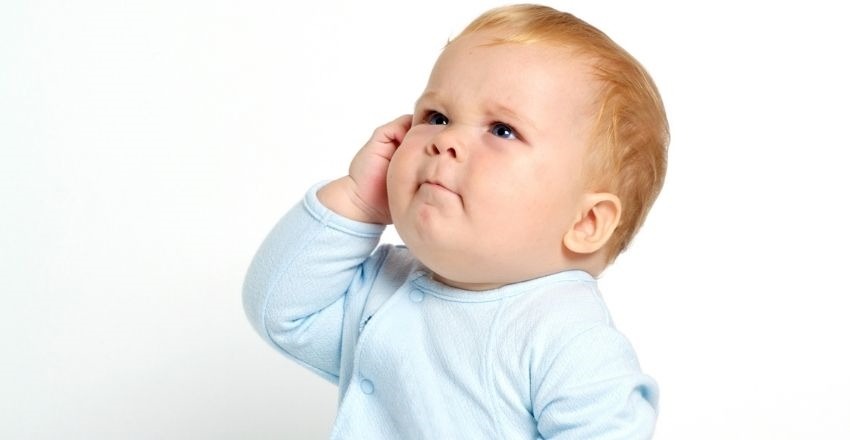What if My Baby Rolls Off the Bed
Babies tin exhibit behaviors that cause parents to wonder, "Is this normal?"
When a baby is rolling eyes, this is i such behavior that causes parents to question if it is normal or a sign of a problem. Here, we volition distinguish normal versus worrisome heart movements.

Mom's Question:
My 6-calendar month-old son simply started rolling his optics up in the back of his head yesterday. It looks scary and I don't know if something is wrong. I have never seen him practise it before and he had washed it at least ten times yesterday and iv times already today.
Delight help, I'm scared that something is wrong.
Easy Babe Life:
Baby Is Rolling Eyes – Possible Causes and What Parents Should Practice
Normal Eye Movements in Babies and Center-Rolling Without Concern
1. Newborn Middle Rolling and Middle Movements
At nascence, infant visual acuity is quite limited. Babies can notice movement, shapes, and patterns, but cannot run into clearly. Instead of 20/20 vision, newborns see in the range of 20/200 to 20/400. Because of this, the eyes may occasionally converge and appear to lose focus. These newborn eye-rolling and other eye movements are expected and completely normal. Information technology is likewise considered normal if your newborn baby is rolling eyes upward when sleepy.
As vision gradually improves over the first few months of life, parents should notice that their infant begins to make middle contact and follow objects moved across the line of vision.
By half dozen months former, infants accept ameliorate distance vision and can notice colors. They effortlessly focus and follow objects, and eye movements are well coordinated. By this fourth dimension, the newborn middle-rolling should accept disappeared.
In addition, infants begin to larn new eye movements from interactions with others such as blinking, and, yeah, situational eye-rolling:
2. Rolling Eyes Because He Can
I can truly understand that you are worried if your infant has just started rolling his eyes. Nevertheless, keep in heed that babies tin exercise all sorts of strange things just because they've figured out how to do information technology.
One of my children stuck their hands then deep into their mouths that they choked, etc… My youngest kept poaching his eyes with his fingers…
Chances are that your baby is just rolling his optics considering he tin! He might be trying to mimic people around him or he enjoys the attention he gets when rolling his optics.
three. Existence Sleepy
Prior to sleeping, eye-rolling can announced along with tired, droopy optics.
iv. Acrimony and Frustration
Some very expressive infants tin can ringlet their eyes while giving a pout or a look of displeasure.
Just like babies can practise odd things basically because they have figured out how, they sometimes as well use these types of behaviors to soothe their own anger. Here is a Q&A with a toddler that both rolls optics and throws tantrums.
Other common behaviors related to anger are to blindside their heads against the floor or hit themselves.
The key matter to recall in all of these scenarios of situational eye-rolling is that the center movements are coordinated and purposeful.
eleven Causes of Abnormal Eye Movements in Babies
There are some situations, yet, where eye-rolling is a sign of a medical problem. Any rolling of the eyes that is associated with decreased or loss of consciousness warrants immediate evaluation. Other abnormal eye movements may betoken a specific eye problem.
one. Nystagmus
This middle condition is characterized past "back and along" motions of the eyes. It may be apparent every bit early on as six weeks of age, or develop at six months when vision should begin to normalize. Nystagmus occurs because of a nerve signal "block" between the heart and the visual cortex of the encephalon. Congenital cataracts, for instance, can cause this problem.
The below video will show yous ii examples of nystagmus.
2. Strabismus
In this situation, one eye drifts or rolls in a different direction than the other. It is normally due to a problem with one or more of the extra-ocular muscles. The affected eye is commonly referred to every bit a "lazy eye". The types of strabismus include those where an heart drifts either toward or away from the nasal bridge.
This video gives a clear explanation of strabismus, how it is diagnosed and how it is treated (if needed).
Misaligned Eyes (Strabismus) and Treatment Explained. What is Strabismus?
iii. Babe Eye-Rolling due to Seizures
If eye-rolling occurs along with a alter in beliefs or unusual body movements, it is likely a sign of a seizure. There are several scenarios where such abnormal centre movements may occur.
i. Febrile Seizures
The about beneficial seizure type is one that is solely caused past a fever. When the torso temperature rapidly increases, information technology triggers a cursory episode of heart-rolling, full-body shaking, and a loss of consciousness. These seizures normally occur during mild viral infections from ages six months to v years former. Although delirious seizures are quite alarming, they do not cause damage to the brain or impair cognitive evolution.
2. Meningitis/Encephalitis
Astringent bacterial or viral infections tin can irritate the encephalon and its surrounding tissues. Such illnesses tin can promote seizures that present as eye-rolling and torso stiffness or jerking. These infants announced very ill, exhibiting low or loftier body temperatures, bulging of the fontanelle, and decreased responsiveness. They require hospitalization for intravenous seizure medication and antibiotics or anti-viral medications.
After the infection has resolved, these infants require follow-upwardly with a neurologist to monitor for persistent seizures and developmental deficits.
iii. Infantile Spasms (Due west Syndrome)
The outset signs of this type of seizure may be a repetitive rolling upwards of the optics. Along with these are brief episodes of the head dropping with jerking of the arms and legs. Infantile spasms are caused past some sort of brain abnormality and warrant evaluation by a neurologist. Y'all can read more most infantile spasms hither at Epilepsy.com
4. Juvenile Myoclonic Spasms
This type of seizure is characterized by rapid blinking or upward rolling of the optics. A variety of body jerking movements is possible during the episodes. Although the onset of these seizures is typically around puberty, information technology is possible to develop them at a younger age.
5. Electrolyte Abnormalities
The kidneys of infants do non fully mature until around six months erstwhile. Prior to this historic period, infants are decumbent to electrolyte abnormalities if given inappropriate fluids. For infants who formula fed, it is very important that the formula be prepared according to the package instructions. If not, low blood sodium or glucose could trigger a seizure.
For this same reason, it is non recommended to give water to an babe during the beginning vi months of life.
Similarly, ingestion of excessive amounts of water can crusade electrolyte imbalances. For this reason, swimming lessons are to be used with caution co-ordinate to the American Academy of Pediatrics until the age of 12 months (source).
4. Additional medical reasons and conditions
A baby may exist rolling eyes due to head injuries, low claret carbohydrate, or hypoglycemia.
If your baby has recently fallen and he is now rolling eyes, y'all should take him or her to the ER immediately. You tin discover more alarm signs subsequently a autumn here.
Ii generally benign conditions that likewise involve babies rolling optics are 1. Paroxysmal tonic upgaze (source) and 2. Paroxysmal tonic downgaze (source).
This video shows an instance of paroxysmal tonic upgaze – is information technology similar to what your baby is doing?
What to Practise if Your Infant is Rolling Optics

As a parent, seeing your baby roll his or her eyes may create feelings of worry and concern. The best matter to do is to consult your healthcare provider. Taking a video of the episodes is helpful since they may not occur during the function visit.
While waiting for the doc's appointment, take notes of both how often and when the rolling occurs (before sleep, later slumber, while eating et cetera), equally well as of any other signs of disease.
If, nonetheless, your infant is less playful, seems excessively sleepy, and is not feeding well post-obit an episode of eye-rolling, you should contact emergency services.
I really hope your infant is well. Expert luck!
Paula
Related Articles
- Baby rolling eyes later on a fall
- Toddler rolling optics and throws tantrums.
- Why do babies hit themselves
Find comments beneath.
Research References
- How to Safely Prepare Formula with H2o
- Juvenile Myoclonic Epilepsy
- Pediatric Aseptic Meningitis Clinical Presentation
- Benign and astringent early-life seizures: a circular in the first year of life
- Your Newborn'due south Hearing, Vision, and Other Senses
- Age-Appropriate Vision Milestones
- Nystagmus
- Strabismus
Source: https://www.easybabylife.com/baby-is-rolling-eyes.html
0 Response to "What if My Baby Rolls Off the Bed"
Post a Comment